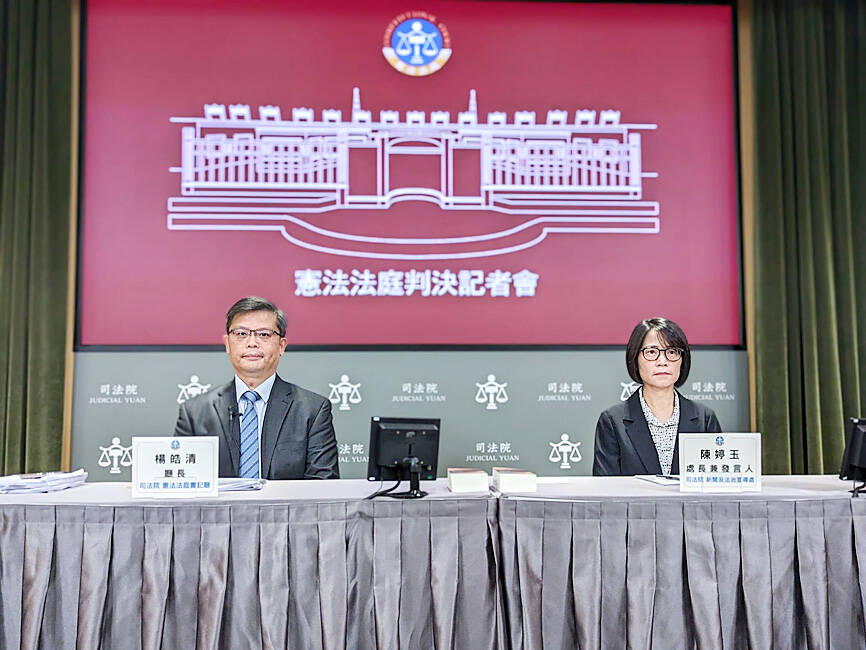Individual doctors may now post advertisements for their practices, after the Constitutional Court yesterday partially struck down an article in the Medical Care Act (醫療法) that banned anyone except medical institutions from advertising medical services.
The ban on medical advertisements by individual doctors stipulated in Article 84 of the act was ruled unconstitutional, as it infringes on freedom of speech and occupation, and the right to equal protection, the court said in a news conference marking the decision.
The court’s judgement, which took immediate effect, voided the ban for individual doctors, while keeping in place the ban on medical advertising by all other people and entities, said Yang Hao-chin (楊皓清), director-general of the court’s clerk department.

Photo: Wu Cheng-feng, Taipei Times
Constitutional Judgement No. 17, 2023, was made following a request for an interpretation made by the Taipei Administrative Court in relation to a fine being appealed by a doctor surnamed Huang (黃), he said.
Huang was ordered to pay NT$50,000 over two Facebook posts promoting a cosmetic injection for wrinkles and hair loss in October 2015, Yang said.
The court consulted the Taiwan Medical Association and Ministry of Health and Welfare in making the decision, Yang said.
The association told the court that it considers the ban a defect in the nation’s medical laws and that credentialed medical doctors should have the right to advertise their practice, he said.
The ministry argued that its ban on individual doctors posting advertisements is proportionate, limited in scope and important to the public interest, but furnished no evidence, Yang said.
The ministry also argued that freedom of speech protections do not apply to medical advertisements, as they are not expressions of belief or conscience, he said.
The court believes that the discrimination against individual doctors does not meet the public interest standard, since the article was written just for administrative ease, he said.
It also found no reason to believe that a meaningful difference exists between medical advertisements posted by individual doctors and hospitals in terms of the public’s right to sound medical information, he said.
Another piece of evidence suggesting the restriction was unnecessary was that the Taiwanese medical field had done without it for 40 years, starting from the promulgation of the original medical care act in 1943 until the ban’s enactment in 1986, Yang said.
Further, banning individual doctors from advertising arguably deprived patients of the information they needed for making fully informed medical decisions, thus harming the public interest, he said.
Huang is the only doctor to receive relief for breaching the law, as he was the sole plaintiff, Yang said.

‘DENIAL DEFENSE’: The US would increase its military presence with uncrewed ships, and submarines, while boosting defense in the Indo-Pacific, a Pete Hegseth memo said The US is reorienting its military strategy to focus primarily on deterring a potential Chinese invasion of Taiwan, a memo signed by US Secretary of Defense Pete Hegseth showed. The memo also called on Taiwan to increase its defense spending. The document, known as the “Interim National Defense Strategic Guidance,” was distributed this month and detailed the national defense plans of US President Donald Trump’s administration, an article in the Washington Post said on Saturday. It outlines how the US can prepare for a potential war with China and defend itself from threats in the “near abroad,” including Greenland and the Panama

A wild live dugong was found in Taiwan for the first time in 88 years, after it was accidentally caught by a fisher’s net on Tuesday in Yilan County’s Fenniaolin (粉鳥林). This is the first sighting of the species in Taiwan since 1937, having already been considered “extinct” in the country and considered as “vulnerable” by the International Union for Conservation of Nature. A fisher surnamed Chen (陳) went to Fenniaolin to collect the fish in his netting, but instead caught a 3m long, 500kg dugong. The fisher released the animal back into the wild, not realizing it was an endangered species at

The Chinese Nationalist Party (KMT) is maintaining close ties with Beijing, the Democratic Progressive Party (DPP) said yesterday, hours after a new round of Chinese military drills in the Taiwan Strait began. Political parties in a democracy have a responsibility to be loyal to the nation and defend its sovereignty, DPP spokesman Justin Wu (吳崢) told a news conference in Taipei. His comments came hours after Beijing announced via Chinese state media that the Chinese People’s Liberation Army’s Eastern Theater Command was holding large-scale drills simulating a multi-pronged attack on Taiwan. Contrary to the KMT’s claims that it is staunchly anti-communist, KMT Deputy

The High Prosecutors’ Office yesterday withdrew an appeal against the acquittal of a former bank manager 22 years after his death, marking Taiwan’s first instance of prosecutors rendering posthumous justice to a wrongfully convicted defendant. Chu Ching-en (諸慶恩) — formerly a manager at the Taipei branch of BNP Paribas — was in 1999 accused by Weng Mao-chung (翁茂鍾), then-president of Chia Her Industrial Co, of forging a request for a fixed deposit of US$10 million by I-Hwa Industrial Co, a subsidiary of Chia Her, which was used as collateral. Chu was ruled not guilty in the first trial, but was found guilty